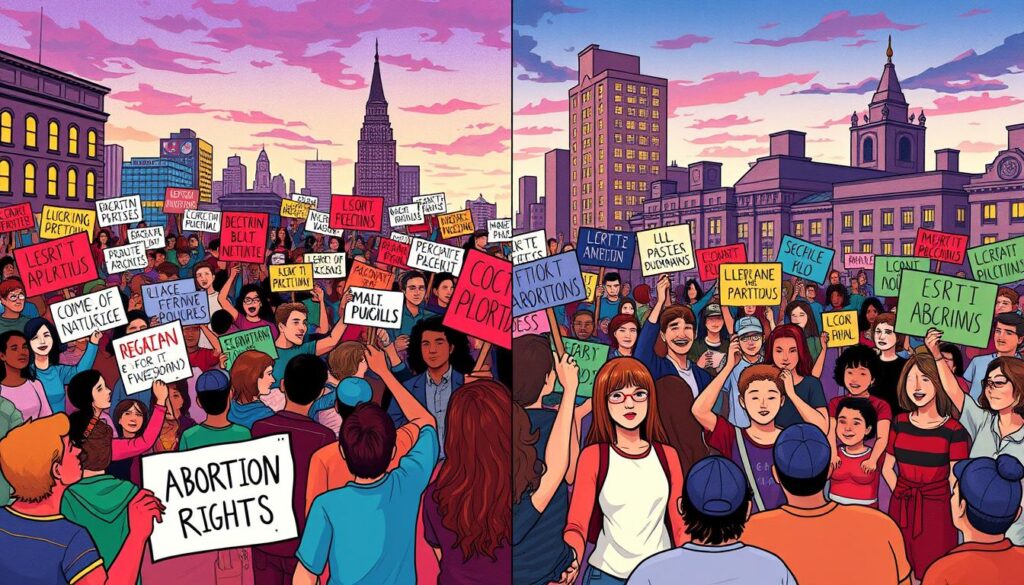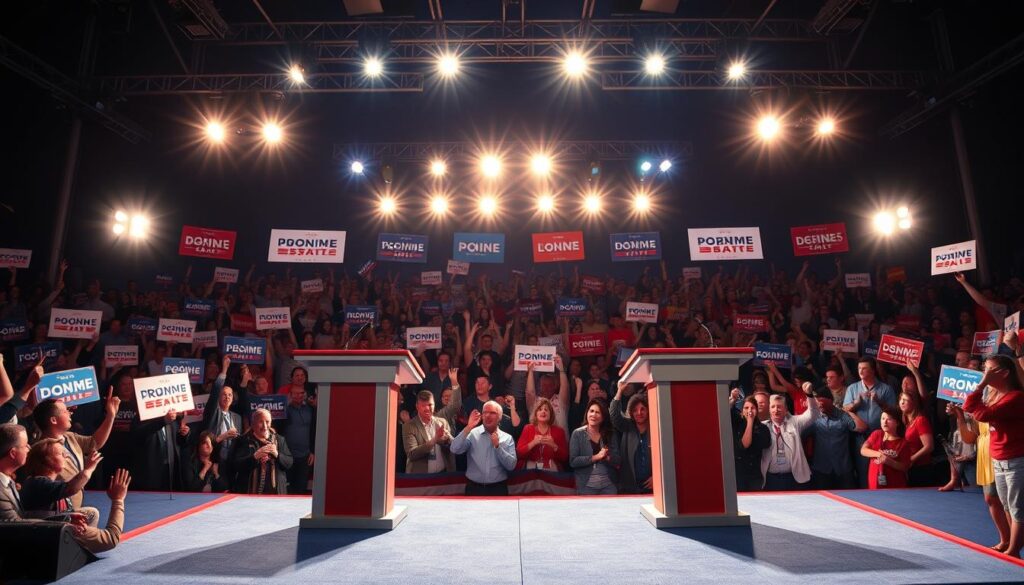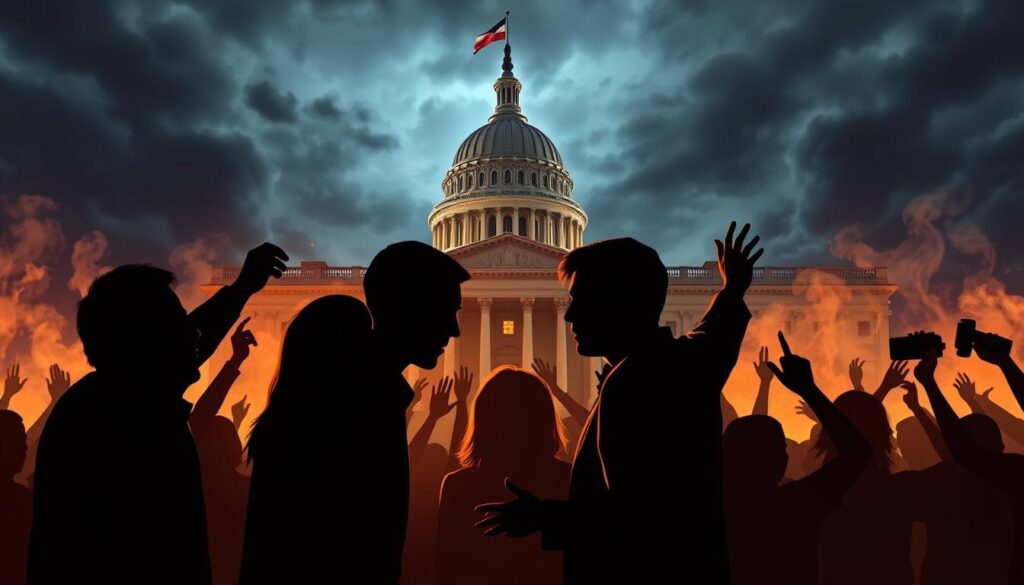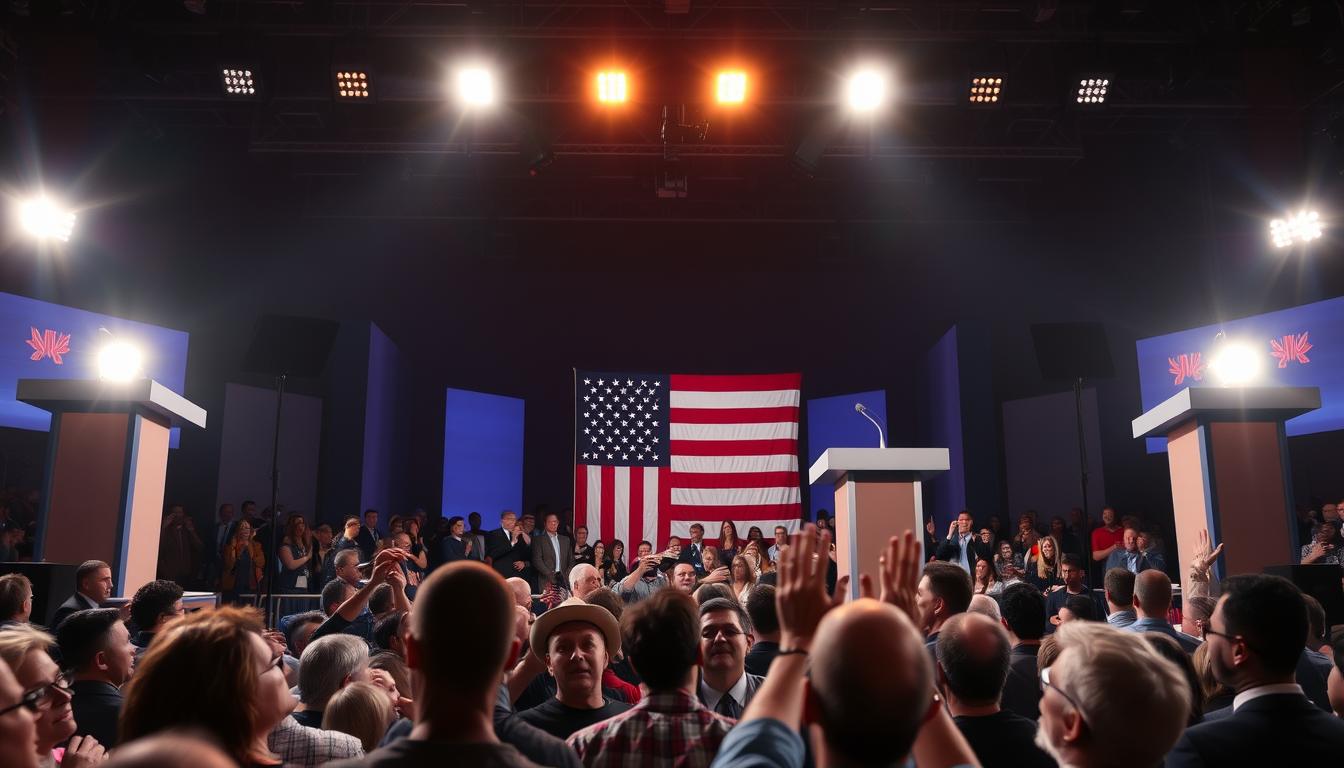The vice presidential debate has concluded, leaving many wondering who came out on top. JD Vance, the Republican candidate, faced off against Tim Walz, the Democratic candidate. The debate was filled with intense moments and clear differences in their views. Vance’s performance was seen as more polished and confident, winning over a large part of the audience.
Key Takeaways
- JD Vance delivered a more polished and confident performance, earning the approval of Republican viewers.
- Tim Walz struggled at times, even admitting to being a “knucklehead” over a claim about his experience in China.
- Heated exchanges over issues like abortion, climate change, and immigration defined the debate.
- The moderators’ interjections and microphone cutoff of Vance drew criticism from independent and Republican voters.
- Post-debate polling and analysis indicate a slight edge for Vance, but the ultimate impact on the 2024 election remains to be seen.
Voter Reactions to Key Debate Moments
The vice presidential debate was highly anticipated, and viewers from all sides of the political spectrum had varied reactions. A real-time “debate dial” feedback system, used by Fox News viewers, provided insights into how the candidates’ performances were received. This feedback system gave a glimpse into the opinions of different voters.
Vance Explains Reversal on Trump Support
JD Vance, the Republican candidate, made a significant point when he spoke about his past criticism of former President Trump. He claimed he was “wrong” about Trump, highlighting the former president’s policies that brought “rising wages, rising take-home pay, an economy that worked for normal Americans, a secure southern border.” Vance stated that he didn’t believe Trump could achieve these goals. This explanation led to a significant increase in Republican approval, with ratings exceeding 80% and even hitting over 90% at times.
On the other hand, Democratic viewers showed strong disapproval, with ratings plummeting below 40% and hitting nearly 20% at one point. Independents, however, had a more balanced reaction, with their approval ratings mostly between 40% and 60%.
| Voter Group | Approval Rating |
|---|---|
| Republicans | Over 80% and reaching 90% at one point |
| Democrats | Below 40% and near 20% at one point |
| Independents | Mostly between 40% and 60% |
The differing reactions to Vance’s explanation of his change in stance on Trump support underscored the deep political divisions in the electorate. Republicans largely welcomed his newfound appreciation for Trump’s policies, while Democrats strongly opposed it.
Contrasting Views on Abortion Rights
The abortion rights debate dominated the vice presidential debate, with Tim Walz and JD Vance presenting opposing views. Walz argued that abortion is a basic human right, defending Minnesota’s abortion laws. Vance, on the other hand, declined to commit to a national abortion ban, despite earlier indications of support.
This stark contrast in opinions on abortion rights underscores the deeply partisan nature of the issue. Republican voters were critical of Walz’s stance, while Democrats and independents generally supported him. The differing views on women’s healthcare policy are expected to influence the 2024 election, as candidates aim to win over voters.
Differing Positions on State Abortion Laws
Walz firmly defended Minnesota’s abortion laws, seeing them as a fundamental human right. In contrast, Vance’s ambiguity on a national abortion ban left many uncertain about his stance.
| Candidate | Position on Abortion Rights |
|---|---|
| Tim Walz (D) | Supports liberal abortion laws in Minnesota, arguing it is a basic human right |
| JD Vance (R) | Refused to explicitly support or reject a national abortion ban, despite previous comments suggesting support |
The differing views on abortion rights highlight the deep partisan divide. Walz and Vance represent the opposing sides of the debate. This contrast is likely to resonate with voters and shape the campaign narratives leading up to the 2024 election.

“This is a basic human right,” Walz said, defending Minnesota’s liberal abortion laws during the debate.
The abortion rights debate is central to the 2024 election, with candidates firmly standing on both sides. As voters navigate the partisan divide on abortion, the independent voter views on abortion will be crucial in shaping the election’s outcome.
Climate Change Policies Divide Voters
The vice presidential debate exposed a deep rift over climate change policies. J.D. Vance, the Republican nominee, claimed support for “clean air, clean water.” Yet, he questioned the scientific consensus on climate change, calling it “weird science.”
This stance drew a clear line in the sand, reflecting the partisan divide on climate change. Data from the Fox News Debate Dial showed a drop in support from independent and Democratic voters. Yet, Republican support remained steady. Independent voter support rebounded when Vance criticized Democratic policies for outsourcing energy and manufacturing. He advocated for investing in American workers and the American people.
Vance Casts Doubt on “Weird Science”
Vance’s skepticism towards climate change science starkly contrasted with the Democratic nominee’s call for urgent action. This exchange underscored the stark differences in their environmental policy proposals and visions for a clean energy economy.
The debate reinforced the ongoing partisan divide on climate change. Republicans often doubt the scientific evidence, while Democrats advocate for more aggressive measures to combat global warming. As voters weigh these opposing views, the election’s outcome will significantly influence the future of environmental policy in the United States.
| Candidate | Position on Climate Change | Environmental Policy Proposals |
|---|---|---|
| J.D. Vance (Republican) | Casts doubt on climate science, supports “clean air, clean water” | Prioritizes American jobs and manufacturing over climate policies |
| Democratic Nominee | Acknowledges scientific consensus on climate change | Advocates for bold action to address the climate crisis, promote clean energy |
“The best thing to do is to double down and invest in American workers and the American people.”
– J.D. Vance, Republican Vice Presidential Candidate
who won the vp debate tonight
The vice presidential debate analysis points to a narrow win for JD Vance, the Republican candidate. He presented a more confident and polished performance compared to Tim Walz, his Democratic opponent. Vance effectively addressed his past criticisms of former President Trump, while Walz faced challenges, even admitting to being a “knucklehead” over a claim about his experience in China.
The debate saw intense discussions on abortion, climate change, and immigration. Moderators had to intervene, cutting Vance’s microphone during a heated exchange on border policy. Post-debate polls suggest a slight advantage for Vance, but the debate’s true impact on the 2024 election is yet to be determined.
Key takeaways from the debate include:
- Republican viewers’ approval ratings for Vance soared over 80% during his explanation of supporting Donald Trump, hitting over 90% at one point.
- Democratic ratings for Vance plummeted below 40% and nearly 20% while he discussed his change of heart on Donald Trump.
- Independent viewers’ support for Vance hovered between 40% and 60% during his statement at the debate.
- Republican viewers’ approval plummeted when Governor Tim Walz discussed abortion during the debate.
- Independent and Democratic viewers largely backed Walz’s abortion statements, with independents slightly dipping and stabilizing near Democratic levels.
The debate underscored the significant partisan divides on critical issues. Vance’s ability to address his past criticisms of Trump could have a significant impact. As the 2024 election draws near, these performances will continue to influence the political landscape and voter sentiment.

“The vice presidential debate was a fiery exchange that showcased the deep ideological differences between the two candidates. Vance’s performance may have given him a slight edge, but the true impact on the election remains to be seen.”
Immigration Sparks Heated Exchange
The immigration debate dominated the vice presidential debate, with candidates fiercely debating the Biden administration’s border policies. JD Vance, the Republican nominee, accused the administration of “effectively losing” 320,000 migrant children. He claimed some were “sex trafficked” or “used as drug trafficking mules.” The moderators had to cut the candidates’ microphones as they continued arguing.
Vance also criticized the Harris administration’s “wide open southern border.” Tim Walz, the Democratic nominee, defended the administration’s record, pointing out that border crossings are down from the Trump era. This exchange underscored the ongoing partisan divide over immigration reform proposals and border security concerns.
Independent voters were split on the issue, with some voicing concerns over the border policy discussion and others backing the administration’s stance. The immigration debate is expected to remain a contentious topic leading up to the midterm elections. Both parties aim to sway independent voter views on immigration.
| Key Immigration Statistics | Republican Stance | Democratic Stance |
|---|---|---|
| Border crossings in 2022 | 2.4 million (increase) | 1.7 million (decrease from Trump era) |
| Undocumented immigrants in the U.S. | 11 million (estimate) | 10 million (estimate) |
| Deportations in 2022 | 235,000 (decrease from Trump era) | 400,000 (increase from Trump era) |
The immigration debate will undoubtedly remain a divisive issue in the coming months. Both parties will strive to win over independent voters. They aim to address border security concerns and bridge the partisan divide on immigration.

Fact-Checking Fuels Frustration
The vice-presidential debate turned tense as candidates disagreed over fact-checking by moderators. When the moderators corrected Republican candidate JD Vance on his claim about illegal immigrants in Springfield, Ohio, Vance pushed back. He reminded them that the rules prohibited live fact-checking during the debate.
Vance expressed annoyance at being fact-checked, stating, “Since you are fact-checking me, I think it’s important to say what’s actually going on.” This exchange highlighted the ongoing tensions between candidates and the media over the role of fact-checking and the perception of bias.
Vance Pushes Back on Moderators
The debate showcased the challenges of balancing fact-checking with the flow of the debate. Vance argued that the moderators’ interventions disrupted the discussion, stating, “I think it’s important that we actually talk about the issues instead of just going back and forth on fact-checking.”
This debate over fact-checking fueled frustrations on both sides, reflecting the larger political discourse around the role of the media in holding candidates accountable. As voters seek clarity on the issues, the tension between open debate and rigorous fact-checking remains a point of contention.
| Candidate Reactions to Fact-Checking | Moderator Interventions | Partisan Perspectives on Fact-Checking |
|---|---|---|
| Vance expressed annoyance at being fact-checked, arguing it disrupted the flow of the debate. | Moderators corrected Vance’s claim about illegal immigrants, sparking a pushback from the candidate. | Republicans often criticize fact-checking as biased, while Democrats see it as an important tool for holding candidates accountable. |
| Vance stated, “Since you are fact-checking me, I think it’s important to say what’s actually going on.” | The moderators’ interventions highlighted the challenges of balancing fact-checking with the debate format. | Independent voters may value fact-checking as a way to make informed decisions, but also want candidates to have the opportunity to address the issues directly. |
The debate over fact-checking and its role in political discourse will likely continue to be a point of discussion and contention in the lead-up to the 2024 elections. As voters seek clarity on the issues, finding the right balance between open debate and rigorous fact-checking remains a challenge for both candidates and the media.
Walz’s Military Service Scrutinized
The vice-presidential debate between Senator JD Vance of Ohio and Gov. Tim Walz of Minnesota highlighted civil discourse and policy-focused discussions. Notably, Walz’s military service history was largely absent from the debate. This was surprising, given that Republicans have accused him of exaggerating his military credentials.
Walz mentioned his National Guard service briefly, correcting a claim about his travel to China. Yet, the lack of questioning on this topic was striking. It left many wondering about Walz’s military service and its impact on voters, especially those with partisan views.
Independent voters may have been particularly interested in Walz’s military experience and its influence on his governance style.
Republican attacks on Walz’s military service have been ongoing. They claim he has overstated or misrepresented his time in the National Guard. This has sparked controversy, touching on the sensitive topic of using military credentials in politics. Both veteran support and partisan perspectives on military service are at play here.
The debate’s failure to delve into Walz’s military background left viewers with unanswered questions. As the election nears, this issue may remain a focal point for those examining the candidate military service and military service history of the vice-presidential candidates.
Unasked Questions Linger
The vice presidential debate left several key issues and questions unaddressed, leaving voters without a comprehensive understanding of the candidates’ platforms. For instance, the accuracy of Governor Tim Walz’s claims about his experiences during the Tiananmen Square protests in China was only briefly touched upon. This raised lingering questions about the veracity of his statements.
Moreover, the candidates’ positions on critical matters such as foreign policy, the economy, and social policies were not fully explored. This deprivation of a more robust comparison of their stances is significant. The absence of these discussions highlights the need for future debates to cover a wider range of topics. It ensures that all relevant questions are addressed, allowing voters to make informed decisions.
As the post-debate analysis continues, the public’s desire for more comprehensive and in-depth coverage of the candidates’ views on key issues remains paramount. The unanswered debate questions, missed debate topics, and voter concerns not addressed during the vice presidential debate underscore the importance of future debates. They should focus on a broader spectrum of issues that are crucial to the electorate.
